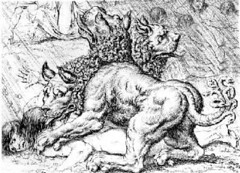Biff is Back!!!
Editor's Note:
Dear Readers,
I received the following note and manuscript in a crumpled DHL envelope this morning:
Dear R.F. Peons:
I have tried to remain incognito and let you jokers run things while I was doing research for my new college psychology textbook, The Three Feminine Personality Types. But I can no longer stand to watch you pussy-up my column! Do NOT, I repeat, DO NOT under any circumstances post any more of your namby-pamby limp-writsted liberal advice on MY BLOG! Enclosed is an entry for What Would Biff Say?
Below is a commentary which is to be posted immediately on Alfalfa Was Right.
Oh, by the way, my shit better be where I left it when I return,and keep your damn hands of Darla!
Biff
Capitalism = Feudalism + Lies
- an economic model by Biff Humble

How blatant is the noble-capitalists'
disregard for us peasants that
they named their private equity firm
after the hound guarding the gates of hell?
It took a while for the news to reach me about U.S. automotive giant Chrysler being acquired by Cerberus Capital Management, a private equity firm. (click here for a great one-paragraph explanation of private equity buyouts)
This is not the largest private equity buyout - if you look close at the numbers you realize Daimler actually paid Cerberus to take the company off its hands - but it was still a landmark, as the New York Times headline read: Cerberus goes where no firm has gone before. And, it connects the logical circle I drew nearly 20 years ago from feudalism to capitalism and back.
At the close of the 18th Century, a number of problems were beginning to make apparent the limits of financial success available through the current economic model, Feudalism.
The First Problem (in two parts):
(A) In Feudalism, responsibility for productivity lies squarely on the shoulders of the owners of capital and the means of production - the nobility.
The peasant does as little work as possible, since any additional effort only enriches his feudal lord. The lord has several recourses available to improve productivity, among them: withholding food, or physical punishment. Both motivational methods are self-limiting. Withholding food will quickly lead to starvation, and reduced productivity. Beating peasants also has a diminishing return in that the physical damage serves to further reduce productivity. So the nobility walks the fine line between too much and not enough pressure to ensure maximum productivity.
The peasant, on the other hand, does everything in his power to save energy and time to create items he can barter, thereby cutting the lord out of the transaction. Creating the concept of taxation attacked this problem, but is ineffective and costly to administer, and adds to the resentment of (B).
(B) The nobility, living in great castles and mansions, become a visible target for the revolutionary wrath of the peasants, whose lives are sliding deeper and deeper into squalor each generation as they are forced to subsidize the nobles' parasitic lifestyle.
The Solution:
Step 1: (A) Transfer the responsibility for productivity from the owners of capital and the means of production onto the backs of the worker. Industrialization forces the serfs into the cities, where they no longer are assured of "three hots and a cot" as they were on the farm.
The Lie:
"There is no more nobility, and all men are created equal (although some were created with much more capital - the result of generations of their noble ancestors fleecing the peasants). Now each has the ability to better himself, through hard work and saving money. If one simply works hard enough, and saves enough, one can become the "new" nobility - the rich capitalist."
The Truth:
If you manipulate the economy to keep a certain number of people jobless, it puts pressure on those who do work to be productive. "If you don't work hard enough, we will fire you, and you and your family will starve."
Step 1: (B) Create the concept of "Democratic Government" to redirect the wrath of the peasants from the nobility to a group of themselves. Transfer the right of taxation from the nobility to the "government."
The Lie:
"You will now govern yourselves. You each have a vote in who leads you, and if anyone fails in the duty to lead, he can simply be voted out of office. This 'government' will protect you and provide for you as the nobles once did, but in order to do so, must collect taxes."
The Truth:
The "new" system of government relieves the pressure of revolt through an escape valve called 'elections.' But, since the new governmental system is still beholden to capital for its continued existence, those with big purses maintain control via puppet strings. "Government-funded programs" use capital from taxation to benefit businesses - so the noble-capitalist continues to siphon off the peasants' capital without appearing to do so.
The Second Problem:
Much of the financial risk of doing business still lies with the owners of capital and the means of production.
No longer able to squeeze the peasants harder when more money is needed, the noble-turned-capitalist is betting on his business success to continue subsidizing his parasitic lifestyle After all, if a company goes belly-up, the workers can look for work elsewhere, but the noble-capitalist has lost his capital - his only means of earning a living.
The Solution:
Step 2: Transfer the financial risk of doing business from the owners of capital and the means of production onto the backs of the worker.
The Lie:
"You can now own the companies for which you work." Noble-capitalists sell ownership "shares" of their companies on the open market, for a price even a peasant can afford.
The Truth:
While the peasants now feel like they have an ownership stake, the noble-capitalist maintains enough ownership that the peasants' stake remains voiceless in matters of management. The peasant now has financial risk without the ability to control the success or failure of the company he "owns." If the business fails, the noble-capitalists' investment is no longer completely on the hook, and the loss of capital is now spread to the peasant, thereby lessening the risk to the noble capitalist.
The Third Problem (in two parts):
(A) The noble-capitalist does no "work"; he is a completely unproductive member of society, yet he still earns "income." So, unlike the peasant, who offers productivity in return for his pay, the money paid to the noble-capitalist simply is siphoned off without any benefit to the company.
(B) The noble-capitalist wishes to maintain the lifestyle of his noble forebears, but two factors limit his income: He has turned the authority of taxation over to the "government," preventing him from simply squeezing the peasants for more money; and he has turned partial "ownership" of his business over to the workers, and must pay them "dividends" to continue the believability of the lie that they are owners.
(A) and (B), along with the noble-capitalists' continued aversion to investing his own capital in his business, leave him with a situation where, over a period of generations, he must bring in more and more peasant capital to continue the growth of his business to support his own lifestyle.
Finally, we reach a point where peasants notice they collectively own a large enough stake in the company to actually demand a voice in its management. They band together in shareholder groups that, united, create a voting block that threatens the noble-capitalists' free hand in wringing maximum profit at the expense of his workers and consumers, and the environment. Add to this equation that the "government" - a creation of the noble-capitalist to reduce his risk to revolution - begins to realize that it has two masters - the noble capital, and the peasant voter - and sometimes acts in ways to benefit the latter over the former. This leads to governmental regulation of the business and finance operations of "publicly-held" companies, further limiting the noble-capitalists' free hand.
The Solution:
Step 3: Taking a page from the peasant shareholders' notebook, the noble-capitalists simply band together to take the companies out of the peasant-shareholders' hands through acquisition by "Private Equity." While this does increase the financial risk of the noble-capitalist, it effectively transfers the means of production out of peasants' hands and back into the hands of the feudal lords - and it moves the business and financial operations out of sight of the workers and that ungrateful child of the noble-capitalist, "government."
As a plus, the means of production is now vastly larger, more productive, and more profitable thanks to the use of generations of peasant capital. This ripe capital fruit can be harvested by the new private equity owner, who then resells the company back to the public market.
The Lie:
"Fuck you, we don't need to lie anymore. We now own the company you fuckers built with your labor and capital, and we will do with it whatever the fuck we please. And, by the way, you may now again address me as 'your highness.'"
A Tertiary Point (Or, There is a Shortcut):
Shortcut #1: Borrow someone else's money, spend it in irresponsible ways which, while providing short term profits lead to long term losses. Take the profits, then leave the investors with the losses.
A writer at Slate.com seems to think there is an upside to this in "Why Economic Bubbles are good"
In essence, the author says economic bubbles are good, because, while initial investors lose their shirts, those that come later can take advantage of the infrastructure created from those shirts. It's the financial equivalent of two people picking up their drycleaning: Person #1 dropped off a dozen Hugo Boss dress shirts, and paid in advance. Person #2 dropped off a tattered JC Penney oxford. When they pick up their orders, Person #1 is told, "I'm sorry, we've lost your shirts. No refunds." Person #2 is presented with his tattered oxford, and 12 Hugo Boss shirts, and only charged for his tattered oxford. After all, the 12 Hugo Boss shirts have already been paid for. It seems to be a zero-sum game ...
... unless you are playing it. Take the sub-prime mortgage industry: The noble-capitalists took advantage of a real estate market bubble, lied to peasants to sell them mortgages they could not afford, and borrowed capital from peasants to finance the mortgages. And when the bubble burst and the foreclosures started, the noble capitalists simply declared bankruptcy, and walked away with the cash they earned from selling the mortgages. The peasants were left holding the bag - on both ends: the mortgagees are kicked out of their homes, and the investors watched their investments disappear down the same capitalist rathole from which all the "wealth generation" on Wall Street emerges.
Shortcut #2: Declare bankruptcy and hand the company, lock, stock, and barrel, over to the creditors (the noble-capitalists), eliminating peasant shareholders' equity in one fell swoop.
Delta Airlines explains how, as it comes out of bankruptcy, it reissues "NEW" shares. Because it went bankrupt, the company is now owned by its creditors, who will sell the "new" shares and pocket the profits. The old shareholders are left holding the bag, and that bag is full of a lot of completely worthless "shares" of ownership in the company. So, who really owned the company in the first place? Why do creditors get a spot in line ahead of the "owners" who invested in good faith? Hell, even the company management (which led it into bankruptcy) gets a spot in line in front of the "owners."
Same for Northwest Airlines here
So, like the old song says, "Meet the new boss; same as the old boss."
-Biff Humble
May 21, 2007
from a bar in
Karst, Slovenia
BUY OUR BOOKS




0 Comments:
Post a Comment
<< Home